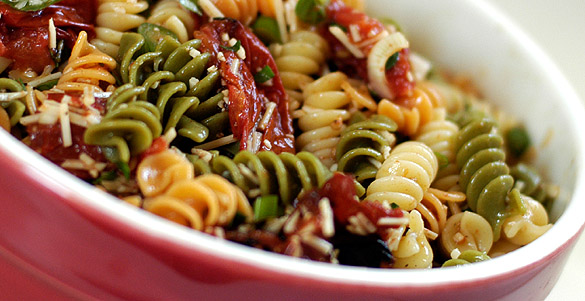On May 1, 2010, 14 people gathered for a BBQ in Germany.
All of them ended up barfing, three were hospitalized.
That’s what happens when someone who is sick makes a pasta salad and leaves it unrefrigerated for 23 hours before serving.
Will a press release before BBQ season really make a difference?
German researchers report in the current Epidemiology and Infection that shortly after the BBQ, 11 cases of Salmonella Enteritidis infections were notified to a district health office in Rhineland- Palatine.
Palatine.
The researchers conducted exploratory interviews via telephone with the hostess, three barbecue guests and one person who had prepared a salad but did not attend the barbecue himself.
The barbecue lasted from about 15:00 hours until well after midnight. According to the hostess, 14 persons attended the barbecue and all of them became ill with gastroenteric symptoms that night or the day after the party.
A person who was supposed to attend the barbecue party had fallen ill the day before (30 April). He had prepared a vegetable pasta salad in the morning and
developed gastroenteric symptoms within 3 h after salad preparation. He was hospitalized the next morning (1 May) and therefore did not attend the barbecue.
Nevertheless, his salad was served at the party. It was stored unrefrigerated for 23 h at approximately 20C before being served. The stored salad contained only pasta, tomatoes, peppers and cucumbers and was dressed with basic vinaigrette from oil and vinegar just shortly before consumption.
Storing the salad at room temperature for 23 h allowed a substantial increase of bacterial load, which can explain the severe infections of all barbecue guests, none of whom belonged to a risk group for severe infections. Proliferation is inhibited or can be reduced by acidic pH values but vinegar was only
added to the salad shortly before serving.
This outbreak underscores the importance of proper kitchen hygiene and food storage in private settings. Food hygiene recommendations should be reiterated to the public at the beginning of the barbecue season by public health actors. Additionally, it should be emphasized that if a person develops gastroenteric symptoms shortly after preparing a meal, the food should be considered as potentially infectious and discarded.
Abstract below.
Severe infections caused by Salmonella Enteritidis PT8/7 linked to a private barbecue
Epidemiology and Infection, FirstView Article : pp 1-7
E. Mertens, H. Kreher, W. Rabsch, B. Bornhofen, K. Alpers and F. Burckhardt
http://journals.cambridge.org/action/displayAbstract?fromPage=online&aid=8542116
A cohort study on a barbecue-associated Salmonella outbreak was conducted to describe the burden of disease and to identify the outbreak vehicle. Dose–response relationships were tested with Fisher’s exact and Wilcoxon rank sum tests (alpha=0·05). S. Enteritidis isolates were cultured and phage-typed. Information was available for 11 out of 14 individuals attending the barbecue; all were healthy young adults (median age 27 years). The attack rate was 100%. Three cases were hospitalized and two developed acute pancreatitis. The exposure common to all cases was a vegetable pasta salad that had been stored unrefrigerated for 23 h. Consuming higher doses was associated with longer median symptom duration (7 days vs. 4 days, P=0·11). S. Enteritidis was found in the stools of nine barbecue guests. Phage type 8/7 was identified in the stools of the salad preparer and one barbecue guest. This outbreak shows that S. Enteritidis can cause serious infection in young healthy individuals without well-known risk factors.

.jpg) The Food Standards Agency (FSA) said
The Food Standards Agency (FSA) said